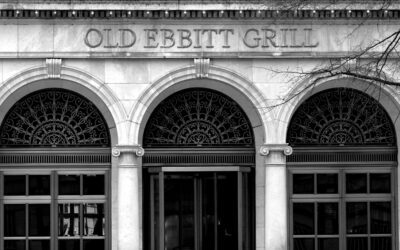New restaurant junk fees are deceptive and unfair
 Restaurants across America are dealing with higher prices of food in a post-COVID world. In places like Washington, DC, the restaurant scene is simultaneously learning how to implement a new law that changes the way restaurant workers are paid. Just because there are new laws about how restaurant workers can be paid and the price of many food items has increased rapidly over the past few years, that is no reason to lie to consumers about the price of a menu item. Travelers United is deeply concerned that restaurants in Washington, DC, are taking advantage of tourists by adding hidden fees to their menus.
Restaurants across America are dealing with higher prices of food in a post-COVID world. In places like Washington, DC, the restaurant scene is simultaneously learning how to implement a new law that changes the way restaurant workers are paid. Just because there are new laws about how restaurant workers can be paid and the price of many food items has increased rapidly over the past few years, that is no reason to lie to consumers about the price of a menu item. Travelers United is deeply concerned that restaurants in Washington, DC, are taking advantage of tourists by adding hidden fees to their menus.
Some cities saw restaurant fees starting in 2023
Many District restaurants, along with restaurants in Los Angeles, San Francisco and a few other restaurants in big American cities, seem to have started to add small fees for seemingly nothing overnight in early 2023. One DC restaurant, Proper 21, added a 5 percent administrative fee. Another, Old Ebbitt Grill, added a 2023 surcharge of 3.75 percent to every menu item. Why? Old Ebbitt Grill is the fourth highest grossing independent restaurant in the United States. Surely they don’t need to lie about a 3.75 percent increase in prices to maintain a full house just because it is the year 2023. So why are restaurants suddenly adding hidden junk fees on their menus? Because no one has stopped them.
 Hidden fees are not allowed under DC law
Hidden fees are not allowed under DC law
The District’s consumer protection law, the Consumer Protection Procedures Act (CPPA), is clear that an item must be sold for the price listed (other than any mandatory taxes). This means that hidden fees are illegal under the District’s consumer protection law. This is why Travelers United is currently suing Hyatt, Hilton, Sonesta and Accord hotel groups for charging deceptive hotel resort fees. This same law can be applied to restaurant junk fees. Travelers United has sued Clyde’s Restaurant Group (whose restaurants include Old Ebbitt Grill, Clyde’s, 1789, Tombs, Marvin’s). They have also sued Knead Hospitality + Design (Mi Vida, Succotash, The Grill, Gatsby, Bistro Du Jour). And a lawsuit has been filed against Proper 21 K Street and Proper 21 F Street, the restaurants that had the aforementioned 5 percent administrative fee.
Travelers United’s lawsuits had immediate impact
These lawsuits had immediate impact. All Clyde’s Restaurant Group restaurants no longer have a fee. All Knead Hospitality + Design Restaurants no longer have a fee. Travelers United sued these three restaurant groups. Then the DC Council voted to change District consumer protection law to allow junk fees of up to 20 percent at District restaurants. The passage of this amendment was specifically targeted at Travelers United’s lawsuits. It was meant to protect District consumers from hidden junk fees. Corporate lobbying groups affiliated with restaurants bombarded the council attempting to stop Travelers United and other public interest non-profits fighting for consumers.
The DC Council pro-junk fee vote
The DC Council voted to allow restaurant junk fees to hypothetically be permitted in certain situations with very specific disclosure requirements. Travelers United believes this is a clear showing of wild corporate lobbying interests. This was passed as a last minute amendment with a 7-6 vote. No other industry has been able to convince the DC Council to write junk fees into law. The Restaurant Association of Metropolitan Washington, the main lobbying group pushing for restaurant junk fees, pushed their junk fee agenda right through a DC Council.
Disclosures are required
Members of the DC Council made it clear in the short debate on the subject that these fees were not necessarily going to staff at all. The hidden fees were not a fee for service. These restaurant fees did not have to be a substitute tip. The fee could all go to the house. The Council said that there will need to be elaborate disclosure of how much of the fee goes to staff and how much to the house. With these new junk fee rules staff gets no protections. Given how poorly this has all gone so far, Travelers United believes restaurants are highly unlikely to ignore this disclosure requirement. If that is the case, Travelers United will sue.
 Legislation across the country is emerging to end junk fees, including a proposed FTC rule. It is hard to fathom how the DC Council thought about going in the other direction in favor of corporate interests. No industry should be able to lie to consumers about the price of an item. Travelers United will continue to monitor the spread of junk fees across America. Plus, we will continue to sue to stop these deceptive fees.
Legislation across the country is emerging to end junk fees, including a proposed FTC rule. It is hard to fathom how the DC Council thought about going in the other direction in favor of corporate interests. No industry should be able to lie to consumers about the price of an item. Travelers United will continue to monitor the spread of junk fees across America. Plus, we will continue to sue to stop these deceptive fees.
READ ALSO
14 top smartphone travel apps to help make travel easier
Court confirms junk fees lawsuit against Sonesta Hotels can proceed to jury trial

Lauren joined Travelers United in 2015. Founded Kill Resort Fees, the only site devoted to ending hidden hotel resort fees. Armed with an arsenal of frequent flyer miles and some extreme budgeting skills, Lauren traveled around the world through 37 countries. Accomplishments include eating at the world’s largest restaurant in Syria, bungee jumping off the Victoria Falls Bridge on the Zambia/Zimbabwe border, running into Anthony Bourdain at a Mexican restaurant in Cambodia and cage diving with Great White Sharks in South Africa.

